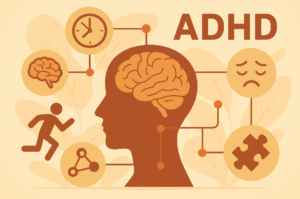Diet and ADHD: A Scientific Perspective on Nutrition and Brain Function
 Attention-Deficit/Hyperactivity Disorder (ADHD) is a neurodevelopmental condition characterized by inattention, hyperactivity, impulsivity, and emotional dysregulation. While stimulant and non-stimulant medications remain the most effective interventions, there is growing scientific interest in the role of diet and nutrition in modulating ADHD symptoms.
Attention-Deficit/Hyperactivity Disorder (ADHD) is a neurodevelopmental condition characterized by inattention, hyperactivity, impulsivity, and emotional dysregulation. While stimulant and non-stimulant medications remain the most effective interventions, there is growing scientific interest in the role of diet and nutrition in modulating ADHD symptoms.
This article reviews the evidence for dietary approaches in ADHD, covering neurobiological mechanisms, nutrients of interest, elimination diets, and practical clinical implications.
1. Why Diet Matters in ADHD
ADHD is strongly associated with dysregulation of the dopaminergic and noradrenergic systems, particularly in the prefrontal cortex and related networks. Nutrition influences these pathways through:
-
Precursor availability for neurotransmitter synthesis (e.g., tyrosine → dopamine).
-
Micronutrient cofactors required for enzymatic activity (e.g., iron, zinc, magnesium, vitamin B6).
-
Energy stability (glucose metabolism and insulin regulation).
-
Neuroinflammation and oxidative stress, which can be modulated by dietary fatty acids and antioxidants.
Thus, while diet is not a causal factor in ADHD, it can modulate symptom expression and treatment response.
2. Macronutrients and ADHD
Protein and Amino Acids
-
Dopamine and norepinephrine synthesis requires amino acids like tyrosine and phenylalanine.
-
A protein-rich breakfast has been shown to reduce morning inattention and improve working memory compared to high-carbohydrate meals.
-
Balanced protein intake prevents postprandial glucose fluctuations, which are linked to irritability and lapses in attention.
Carbohydrates and Glycemic Index
-
High-glycemic foods cause rapid glucose spikes followed by crashes, impairing sustained attention.
-
Low-glycemic index (GI) meals provide steady glucose release, supporting prefrontal cortical function.
-
Evening intake of complex carbohydrates (e.g., oats, whole grains) may aid melatonin synthesis and sleep, which is often disturbed in ADHD.
Fats and Fatty Acids
-
Omega-3 fatty acids (EPA and DHA) are critical for neuronal membrane fluidity, synaptic plasticity, and anti-inflammatory signaling.
-
Meta-analyses suggest small to moderate improvements in ADHD symptoms with omega-3 supplementation, particularly in inattentive subtypes.
-
The omega-6:omega-3 ratio is crucial — modern diets skewed toward omega-6 fatty acids may exacerbate neuroinflammation.
3. Micronutrients and ADHD
Iron
-
A cofactor for tyrosine hydroxylase, the rate-limiting enzyme in dopamine synthesis.
-
ADHD patients often show low ferritin levels, even without anemia.
-
Supplementation in deficient individuals improves attention and reduces hyperactivity.
Zinc
-
Modulates dopamine transporters and GABA/glutamate neurotransmission.
-
Low zinc is associated with greater hyperactivity and impulsivity.
-
Supplementation enhances the response to stimulant medications in several studies.
Magnesium
-
Essential for NMDA receptor regulation and GABAergic activity.
-
Deficiency contributes to restlessness, irritability, and sleep problems.
-
Combined magnesium and vitamin B6 supplementation has shown symptom reduction in small clinical trials.
Vitamins B6, B12, and Folate
-
Act as cofactors in monoamine synthesis and methylation pathways.
-
Folate polymorphisms (e.g., MTHFR) may increase ADHD vulnerability via impaired methylation.
4. Food Additives, Sensitivities, and Elimination Diets
Artificial Colors and Preservatives
-
The Southampton studies demonstrated that food dyes (e.g., tartrazine, sunset yellow) combined with sodium benzoate increased hyperactivity in children.
-
Regulatory bodies (e.g., European Food Safety Authority) recommend warning labels, though effects are strongest in genetically susceptible children.
Sugar
-
Direct causation between sugar and ADHD is not supported by controlled studies.
-
However, high sugar intake exacerbates mood swings and impulsivity via glycemic fluctuations.
Gluten and Casein
-
In a subset of children, gluten and casein sensitivity may mimic or exacerbate ADHD symptoms.
-
Evidence remains mixed; elimination diets should be medically supervised to avoid nutritional deficiencies.
Oligoantigenic Diets
-
Restrictive diets excluding multiple potential allergens (milk, wheat, soy, eggs, food dyes) have shown symptom improvement in 30–50% of children in controlled studies.
-
Benefits are most pronounced in children with co-occurring allergic or gastrointestinal symptoms.
5. Evidence-Based Dietary Interventions
Omega-3 Supplementation
-
Meta-analyses show modest improvements in inattention and hyperactivity.
-
Higher EPA (>500 mg/day) is more effective than DHA alone.
Iron and Zinc Supplementation
-
Effective only in those with documented deficiencies.
-
Should be guided by lab tests (ferritin, serum zinc).
Balanced Diet
-
Whole foods, high in vegetables, fruits, lean proteins, whole grains, and omega-3-rich fats.
-
Minimize processed foods, refined sugars, and artificial additives.
Personalized Nutrition
-
Genetic polymorphisms (e.g., MTHFR, COMT) and microbiome differences may influence response to dietary interventions.
-
Precision nutrition in ADHD is an emerging field.
6. Clinical Implications
-
Dietary interventions are adjunctive: they should complement, not replace, evidence-based medical and psychological treatments.
-
Screening for deficiencies (iron, zinc, magnesium, vitamin D) is reasonable in children and adults with ADHD, especially those with restricted diets.
-
Parental guidance is essential to avoid unbalanced elimination diets that risk growth and development.
-
Future directions: microbiome-targeted therapies, polyunsaturated fatty acid modulation, and nutrigenomics.
Key Takeaways
-
Diet plays a supportive but important role in ADHD management.
-
Protein, omega-3s, iron, zinc, and magnesium are especially relevant for brain function.
-
Artificial food colors and preservatives may worsen symptoms in susceptible children.
-
Elimination diets show benefits for a subset, but require medical supervision.
-
Nutrition works best as part of a multimodal, personalized treatment plan for ADHD.
✦ About the Author
I’m Dr. Srinivas Rajkumar T, MD (AIIMS, New Delhi), Consultant Psychiatrist based in Chennai, with a strong clinical and research focus on ADHD across the lifespan. My work explores not just medication, but also neurobiology, nutrition, and non-pharmacological interventions such as neuromodulation, neurofeedback, and diet-based strategies. I aim to bridge science with practice, helping patients and families understand ADHD in a holistic, evidence-based way.
📍 Mind and Memory Clinic, Apollo Clinic, Velachery, Chennai (Opp. Phoenix Mall)
📞 +91 85951 55808
🌐 srinivasaiims.com